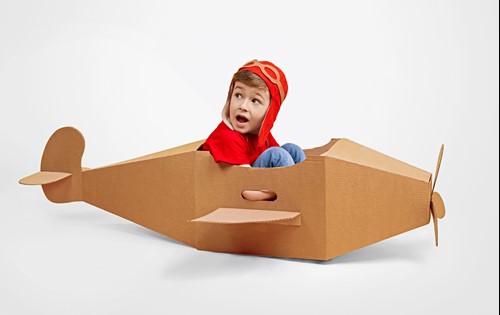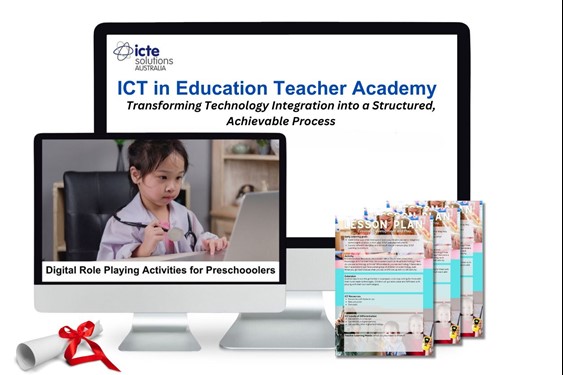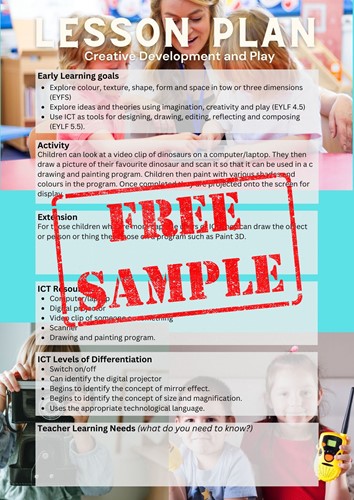By Michael Hilkemeijer
What pretend play becomes when you pair it with technology, reflection, and support
You’ve probably set up dramatic play areas before—maybe a doctor’s surgery, a kitchen, or a dress-up corner. Children play enthusiastically… but sometimes, it’s hard to tell what they’re actually learning.
What if your pretend play corners could become rich, language-filled learning zones—guided by technology, supported by peers, and aligned to curriculum outcomes?
Why Digital Role Play Isn’t Just Fun—It’s Foundational
-
Encourages oral language, empathy, and imagination
-
Strengthens communication through expressive ICT use
-
Builds sequencing, storytelling, and digital literacy skills
And inside the ICT in Education Teacher Academy, you don’t just get the activity—you get the how, the why, and the what next. Each lesson is a stepping stone in your professional growth.
Six Role Play Lessons That Grow with You
Each lesson below is from the membership—and includes the digital tool used, the learning focus, and how members extend the activity using the Wisdom Tool, workbook reflections, and peer community feedback.
1. 🎭 Puppet Pals Digital Role Play
Tool: Puppet Pals / Felt Board apps on iPad
Learning Focus: Narrative structure, oral language, multimodal expression
Mia started by following the membership’s lesson plan for digital storytelling. Her children recorded puppet-style performances, narrating their stories and animating their characters. But the transformation didn’t happen in the app—it happened in her reflection.
After using the Observation Guide to track storytelling structure, Mia shared a question in the member community:
“Has anyone used Puppet Pals with children who struggle to verbalise?”
The responses led her to explore story prompts, voice scaffolds, and a group retelling structure. A simple storytelling activity grew into a collaborative language project.
📌 Using the Wisdom Tool, Mia uncovered member strategies for storyboarding, emotion modelling, and multilingual narration—resources she would never have thought to search for on her own.
2. 🏥 Playing Doctors with Software
Tool: Doctor-themed software on laptop or desktop
Learning Focus: Social roles, empathy, sequencing, purposeful ICT use
Emma introduced her class to a digital doctor simulation as part of a hospital role play. At first, it was light-hearted pretend play. But once she started tracking how children used the tool and posted reflections in the member community, she realised the potential to build real-world understanding.
Children began checking pretend X-rays, managing appointments, and role-switching using prompts Emma sourced from the Members’ Library.
“I’ve never seen so much rich language happening in our dramatic play zone,” she said.
She then adapted the activity using a peer’s printable visual prompts and posted her own updated version—complete with keyboard overlays and a digital diagnosis board.
3. 📱 Everyday Technology in Role Play
Tool: Defunct mobile phones, torches, baby monitors
Learning Focus: Symbolic use of ICT, identity-building, social communication
Shane added everyday tech props to his dramatic play zones after accessing the "Everyday Tech in Role Play" lesson. His group began with mimicking adult behaviours—but through observation and community feedback, this expanded into layered storytelling.
One child used a monitor to "check the baby," while another used a torch to conduct "plumbing repairs" under the sink. Shane reflected on these moments using the membership workbook and explored next steps via the Wisdom Tool.
💬 He posted a classroom photo and asked,
“How do you encourage children to link home technology with dramatic play?”
The responses helped him scaffold tech-based dialogue, introduce real-world routines (like grocery orders or home checklists), and invite children to co-construct digital play stories.
4. 🐝 Bee Bot Programming for Language & Communication
Tool: Bee Bot programmable toy
Learning Focus: Directional language, problem-solving, spelling
In this interactive role play activity, children navigate a Bee Bot over letter mats to spell out their names or familiar words. What begins as a simple programming task turns into an engaging communication experience.
One educator noted:
“I used this to prompt directional language—‘go forward’, ‘turn right’—but then it became about storytelling. One group turned it into a game show.”
When shared in the community, the idea sparked discussions on adding background stories, setting up themed maps (pirate islands, cities), and even pairing Bee Bots with a “phone a friend” station.
📌 The Wisdom Tool led one member to a blog on using Bee Bots for expressive storytelling—and she immediately integrated it into her next session.
5. 📞 Mobile Phone Conversation Role Play
Tool: Non-working or pretend mobile phones
Learning Focus: Social communication, digital etiquette, imaginative dialogue
This simple yet powerful lesson invites children to use mobile phones as part of conversation-based role play. At first, the children acted out scenarios like calling a parent, a firefighter, or a friend. But guided by the membership plan, the teacher introduced scripted role cards and layered in digital communication norms like turn-taking, greetings, and tone.
One member reported:
“The conversations moved from random to structured. They started using real dialogue patterns—introducing themselves, saying goodbye, and even leaving ‘voicemails’.”
Another member added a classroom phone book with pictures, and shared the template in the forum.
6. 🚌 Bee Bot School Bus Role Play
Tool: Bee Bot programmable toy + floor mat + blocks
Learning Focus: Sequencing, spatial language, turn-taking
This activity invites children to imagine Bee Bot as a school bus, navigating a street circuit to pick up and drop off passengers (toys or classmates). Children act as drivers, passengers, and traffic controllers—layering role play on top of foundational coding skills.
What makes it unique in the membership is how it’s scaled over time. One educator started with simple routes. But after using the reflection prompts, she guided children to co-create new maps with landmarks, traffic rules, and route schedules.
Her photo journal of this evolution—shared in the membership community—showed how children began scripting their roles, solving route conflicts, and managing resources.
What Makes This FREE SAMPLE Lesson Plan Different?
When you download this free digital role play activity, you’re not just getting a one-off idea—you’re experiencing the way members of the ICT in Education Teacher Academy plan, implement, and grow from every lesson.
Here’s what to look for inside the free sample—and why it matters to you:
Observation & Assessment Table
What it includes:
-
Clearly identified Higher Order Thinking Skills
-
Observable Computer Skills
-
Relevant Key Learning Areas (KLAs)
-
Prompts to help you document learning as it happens
Why this matters:
Instead of guessing what to look for or writing generic notes, this table gives you a ready-made observation guide. You’ll know exactly what thinking, ICT capabilities, and cross-curricular learning are happening during the activity.
It turns informal play into assessable learning.
📋 And it makes linking to outcomes (like EYLF 4.2, 5.5, etc.) faster and clearer when writing reports or portfolios.
“Connecting This to Your Professional Growth” Section
What it includes:
-
Suggestions for how this lesson connects to other content in the membership
-
Links to related workshops, videos, or forum prompts
-
Encouragement to reflect and grow your confidence
Why this matters:
Many educators feel stuck doing isolated activities that never lead anywhere. This section helps you treat each lesson as a step forward. It connects the dots between what you’re teaching and how you’re growing as an ICT-integrating educator.
You’ll see how a simple dinosaur painting or Bee Bot story becomes a real opportunity to reflect on:
-
How children express ideas through tech
-
How your role is shifting from instructor to facilitator
-
Whether you're ready to try more open-ended or peer-designed ICT experiences

Workbook Guidance
What it includes:
-
Ties to specific pages in the Membership Workbook (e.g., pg. 21, pg. 28, etc.)
-
Action steps to help you document your growth
-
Prompts to assess how well the activity supported learning, engagement, and digital capability
Why this matters:
This isn’t about ticking boxes—it’s about building your professional confidence with technology in early childhood.
The Workbook helps you:
-
Track your own journey—you’ll actually see how your ICT teaching improves over time
-
Plan better each term—because you’ll notice what worked, what didn’t, and what to try next
-
Get credit for your learning—by linking to the Australian Professional Standards and EYLF outcomes
Members say the workbook transforms how they think about their teaching—not just what they do.
Summary: Why This Free Sample Is More Than Just a Lesson
| FEATURE | WHAT IT IS | WHY IT HELPS YOU |
|---|---|---|
| Activity Plan | A ready-to-go ICT-integrated role play lesson | Easy to implement, no extra planning neededEasy to implement, no extra planning needed |
| Observation Table | Clear learning behaviours, ICT skills, KLAs | Makes assessment visible and documentable |
| Professional Growth Links | How the lesson connects to workshops, forum, videos | Keeps your growth intentional, not accidental |
| Workbook Guidance | Action prompts linked to reflection and standards | Builds your digital confidence step by step |
Want more lessons like this?
🟢 Join the ICT in Education Teacher Academy
💰 Choose the annual plan to save more and give yourself a full year of supported growth.
✨ No pressure. Cancel anytime. But once you experience this structure, support, and simplicity—you’ll want to stay.

Scaling a Single Role Play Idea in Early Years: What One Lesson Plan Can Become
What happens when a single role play activity becomes the foundation for language growth, digital skills, and educator confidence?
If you’ve ever searched for role play ideas for preschool, you know how easy it is to find lists: dress up as doctors, pretend you’re at the shops, or act out a phone call. But what those ideas rarely show is how to build from there.
Inside the ICT in Education Teacher Academy, members don’t just get access to dozens of role play activities for early years—they learn how to scale them. They move from running a simple activity to growing a rich learning experience, backed by technology, community feedback, and reflection tools.
In this blog, we’ll show you exactly how that happens—using one membership lesson as a live example.
The Starting Point: Mobile Phone Conversation Role Play
This activity is a member favourite because it’s deceptively simple and wonderfully flexible.
Lesson Snapshot:
-
Title: Mobile Phone Conversation Role Play
-
Digital Tech: Pretend or non-working mobile phones
-
Learning Focus: Social communication, turn-taking, digital etiquette
-
EYLF Outcomes: 5.3, 4.5, 1.4
Children are invited to use pretend phones to engage in conversation with peers, practising greetings, storytelling, and active listening. It’s a familiar, playful context—but it becomes so much more when scaled intentionally.
Scaling the Lesson: What One Idea Becomes Over Time
Below is a breakdown of how members scale this one role play idea for preschool—from introducing the activity to co-creating new play-based digital experiences.
| Teaching Focus | What You Do with the Lesson | What You Gain |
|---|---|---|
| Getting Started | Download and run the activity using pretend phones. Use suggested prompts to encourage turn-taking. | Begin integrating ICT meaningfully into role play. Build confidence using a simple digital prop. |
| Building Confidence | Use the Observation Table to document how children engage with conversation structure and digital etiquette. Adjust prompts for diverse learners. | Learn to track real learning (not just play), link to outcomes, and scaffold participation. |
| Extending the Experience | Children begin creating recurring characters or storylines (“This is the pizza shop!”). | Add a classroom phone book, voicemail scripts, or “missed call” notepads. |
| Sharing & Leading | Post an example in the community forum. Support another member’s version with advice or your adaptation. | Develop leadership and mentoring confidence. See how your version of the lesson inspires others. |
What Members Say at Each Stage
“At first, I just followed the prompts. By week two, the children were scripting their own characters.”
“The contact cards I downloaded from the community changed everything—now the play is structured, not chaotic.”
“Seeing my version help another educator gave me the confidence to lead a discussion about language learning in play.”
How the Workbook Guides Your Professional Growth
Every membership lesson connects to structured workbook pages. These aren’t generic templates—they’re powerful tools that help you reflect, plan, and grow with intention.
| Growth Stage | Workbook Pages Used | Why It Matters |
|---|---|---|
| Introducing the Lesson | Observation & Exploration (pg. 21) | Helps you track how children engage with the ICT tool, including turn-taking, verbal interaction, and imaginative language. |
| Differentiating & Adapting | Differentiation in ICT Learning (pg. 28) | Enables you to note how different learners respond, identify language support needs, and adjust the lesson accordingly. |
| Extending Practice | Safe & Ethical Use (pg. 32) + Reflection Prompts | Encourages safe device handling, respectful turn-taking, and ethical use of pretend tech in group play. |
| Leading & Sharing | Workshop & Community Reflection (pg. 38) | Supports your transition from user to leader—document your mentoring, post your adaptations, and track how your teaching practice evolves. |
This is how one role play activity for early years becomes a genuine checkpoint in your professional journey. You’re not just trying ideas—you’re becoming more intentional, more confident, and more capable with every step.
What Else Supports the Scaling?
🔹 Role Play Activities Come with Built-In Guidance
Each membership lesson includes:
-
Clear instructions and materials
-
Suggestions for adapting to different classrooms
-
A built-in observation table with learning skills and outcomes
-
Guidance that ties the activity to EYLF and APST
-
Reflection questions to help you grow with each experience
You’re never left wondering what to do next.

Search the Wisdom Tool for More Role Play Ideas for Preschool
Want to take the activity further?
Use the Wisdom Tool to explore search terms like:
-
“examples of role play in early years”
-
“symbolic technology use”
-
“conversation-based dramatic play”
You’ll find real lesson adaptations, educator experiences, and shared visuals that make it easier to scale your own approach.

The Community Keeps Ideas Fresh
Each role play idea grows stronger through collaboration. You’ll find shared:
-
Photos and setup inspiration
-
Printable classroom phonebooks or call logs
-
Suggestions for connecting phone play with home routines or cultural storytelling
-
Support from educators trying the same activity in different ways
One member shared: “We turned our phone play into a helpline. Children started giving each other advice—‘Try resting!’ or ‘You need a blanket.’”
What One Lesson Can Do for Children and Educators Alike
When done with intention, a single role play activity can support:
| FOR CHILDREN | FOR EDUCATORS |
|---|---|
| Oral language and communication skills | Stronger planning and observation |
| Turn-taking, empathy, and identity | Confidence using digital props intentionally |
| Understanding of real-world tech | Ongoing professional growth mapped in your workbook |
| Literacy and sequencing through narrative | Community support and peer collaboration |
And This Is Just One Lesson…
The Mobile Phone Conversation lesson is only one example. The membership includes dozens of role play activities for early years including:
-
📍 Bee Bot School Bus Adventure
-
🧑⚕️ Playing Doctors with Interactive Software
-
🎭 Puppet Pals Digital Storytelling
-
🏠 Everyday Technology Role Play
-
🐝 Spelling & Navigation with Bee Bots
-
🎤 Outdoor Storytelling with Recorded Soundscapes
Each one supports learning. Each one supports you.
Join the Membership and Build Your Confidence with Role Play
When you join the ICT in Education Teacher Academy, you unlock:
-
A full library of role play ideas for preschool
-
Step-by-step lesson plans with built-in scaling support
-
The Wisdom Tool to find answers and adaptations
-
Peer feedback from educators working just like you
-
A workbook that helps you document your growth—lesson by lesson
🔗 Join today
💰 Choose the annual plan to get the best value and a full year of support and transformation.
Cancel anytime. But once you see how one lesson can grow—you won’t want to stop.
How to Build a Year of Purposeful ICT Role Play in Early Childhood (Without Reinventing the Wheel)
“I don’t want to just wing it term by term.”
That’s something we often hear from early childhood educators—especially when it comes to role play in early childhood. You know it matters. You want to do it well. But without a clear structure or ongoing support, it often becomes a series of isolated moments:
-
A pretend kitchen this week
-
A doctor’s corner next week
-
A toy phone sitting unused after day three
And all the while, you’re wondering:
“Is this really hitting the learning outcomes? Am I scaffolding growth over time? Is it enough?”
If you’ve ever felt this, you’re not alone.
The ICT in Education Teacher Academy was built to solve exactly this problem—by giving you a full library of role play activities for preschoolers that are not only fun, but purposeful, tech-integrated, and reflective of the importance of role play in early years education.
And in this blog, we’ll show you how members build an entire year of confident, connected role play using the membership.
The Problem with Piecing Together Your Planning
If you're searching for role play ideas for preschool on Instagram or Pinterest every weekend, you’re not planning—you’re surviving.
Most educators:
-
Try to recreate inspiration from scattered online sources
-
Struggle to link role play to EYLF or assessment goals
-
Use technology inconsistently or without confidence
-
Don’t have time to reflect, scale or adapt what works
The result? Role play becomes repetitive, disconnected, or unstructured.
Yet we all know the importance of role play in early years: it’s how children make sense of the world, express identity, and develop empathy. When paired with digital tools, role play becomes a powerful way to build ICT capability, language, and thinking skills—but only if it’s done intentionally.
What Members Do Differently
Inside the ICT in Education Teacher Academy, members don’t plan by searching—they plan by selecting.
They choose from dozens of digital role play activities for preschoolers in the lesson plan library, then adapt and extend them using:
-
The Wisdom Tool (to explore member examples and ideas)
-
Their Professional Workbook (to reflect, adapt, and observe)
-
Peer feedback (to personalise for their learners)
But most importantly—they plan with confidence for the term ahead.
Sample Year Using Membership Role Play Lessons
Here’s what a year of purposeful ICT-integrated role play might look like using just 4 core membership lessons:
| TERM | THEME | ACTIVITY | ICT TOOL | FOCUS AREAS |
|---|---|---|---|---|
| Term 1 | Identity & Belonging | 📞 Mobile Phone Conversations | Pretend phones | Communication, turn-taking, personal identity |
| Term 2 | Our Community | 🏥 Playing Doctors with Software | Desktop computer | Role relationships, empathy, real-world tech use |
| Term 3 | Exploring Our World | 🏠 Everyday Technology in Play | Defunct phones, torches | Symbolic ICT use, narrative building |
| Term 4 | Creativity & Storytelling | 🎭 Puppet Pals Storytelling | iPad app | Story structure, oral language, digital expression |
Each of these builds on the last—children begin with role play as connection, then use it for imagination, problem-solving, and narrative development.
And while children grow, you grow too—documenting your progress through observations, critical reflections, and differentiated planning templates.
Role Play That Evolves With You
What makes these lessons different is that they don’t stop at setup.
Let’s take Mobile Phone Conversations as an example:
| PHASE | WHAT CHILDREN DO | WHAT YOU DO |
|---|---|---|
| 🟢 Initial Use | Pretend call family or helpers using toy phones | Prompt conversations using visuals or story starters |
| 🟡 Middle Term | Create recurring characters (“Pizza shop”, “Vet”) | Add voicemail templates or phonebooks with pictures |
| 🔵 End of Term | Design their own scenarios and calls | Use workbook tools to reflect, assess, and plan next steps |
This is how you move from implementing a fun idea to delivering a high-impact role play experience for preschoolers—and tracking your own growth as an ICT-integrating educator.
“But What About the Tech Side?”
We get this question often:
“I’m confident with dramatic play, but not with ICT.”
That’s exactly why the membership lessons are written specifically for early years educators—not tech experts. They blend developmentally appropriate digital tools into familiar play-based structures.
You’re not sitting children at a computer for hours. Instead, you’re:
-
Letting them use Bee Bots to act out transport or mail routes
-
Helping them use audio tools to record phone conversations or character voices
-
Supporting them to retell their stories using animation apps like Puppet Pals
-
Guiding them through basic computer activities for preschoolers that are embedded in storytelling or community themes
Every digital tool is paired with an outcome. Every activity comes with an observation table. And every lesson shows you how to move forward—confidently.
What Makes These Lessons Work Over Time
Each role play lesson in the membership includes:
-
A clear activity outline
-
EYLF-linked learning goals
-
Observational prompts (Higher-order thinking, ICT skills, KLAs)
-
Reflection questions to support your growth
-
Links to workbook pages that help you assess, scale, or adapt the activity
-
Peer examples, adaptations, and ideas via the community and Wisdom Tool
You're not just collecting activities—you’re building a practice that evolves each term.
✨ One Membership. A Year of Purposeful Role Play.
When you join the ICT in Education Teacher Academy, you stop asking:
“What should I do next?”
You start planning lessons that:
-
Are engaging and inclusive
-
Use ICT meaningfully
-
Develop across the year
-
Support both child learning and your professional development
Ready to Plan a Year You Feel Proud Of?
🔗 Join the ICT in Education Teacher Academy
💰 Choose the annual plan to save more and give yourself the full year to scale, reflect, and grow.
Cancel anytime. But once you start building your year with confidence—you won’t want to go back.

Understanding the Importance of Role Play
Role play helps children make sense of the world. Therefore, it must also reflect the technological world in which we all live in. If well-planned, it can encourage cooperative play and gives the children opportunities to use language, develop literacy and numeracy skills. Incorporating ICT into role play can give children the confidence they need to use new ICT tools with which they are familiar with and this helps even those who might otherwise be reluctant to do so.
When planning role play, it is important to consider what technology the children have at home but to understand whether the children are allowed to use the technology and for what purpose.
Important things to consider when planning role play with ICT includes:
- As an early childhood teacher, that you value and understand these developing competencies in ICT – this will help you to plan for challenging and stimulating role play with clear learning intentions that build on what the children already know and do.
- Planning will be informed by discussions with other teachers and parents and by ongoing observations and assessments of the children.
- Develop a clear understanding of children’s ICT competencies, in particular in relation to the vast range of technologies with which children come into contact.
- Appreciate the links between home use of ICT and children’s ICT competencies in order to further develop competencies in the early childhood setting.
We all develop our competencies in ICT differently due to access we have to ICTs at home. If you are to understand these competencies in ICT you will also need to:
- Ask parents and carers more than just what ICT is available at home.
- Ascertain what access children have had to ICT devices.
- Understand the nature of ICT activities children have had at home.
So when you start to plan to use ICT in role plays it is best that you consider:
- The life experiences and knowledge of children;
- If the children will be involved in the setting up of the role play and what will they do;
- What the attitudes of the adults involved the role play will be;
- What spaces you have available;
- Will it be indoors or outdoors?
- How much time is available for the setting’s daily routine?
- Is there the opportunity for the role play to develop over time?
- The quality and appropriateness of the resources.
Reasons why Role Play is Important
There are many benefits of role playing for early childhood. Role playing is fundamental in enhancing skills for healthy development. It is not only fun but using imagination can improve creativity and promotes better performance in school. The importance of role play in early childhood education has a lasting impact on learning throughout a child's life.
To answer the question ‘what is role play in early childhood education’, it is to do with developing strong problem-solving approaches in children when dealing with issues, it allows them to take up characters out of real life, and in terms of technology use, it helps them make sense of the world, and therefore, must reflect the technological world in which we live.
Let’s take a closer look at the importance of role play in early childhood education.
Encourages Creativity and Imagination
Research shows that a child’s capacity for cognitive flexibility and creativity are linked to playing. Playing therefore, helps them exercise their brain and trains it to practice using imagination at an early stage.
Why is this important? This is great for problem-solving not only in the present, but also in the future. For example, later in life they will use their imagination to enjoy a good book etc.
Enrich Language and Enhance Communication Skills
My young daughter is very quick to pick up new words. All young children are like this so coupling that with a character they love will word wonders for them. As a result of their new vocabulary, they will gain confidence with their communication and will learn to convey messages by picking their words carefully. This also helps them to learn to listen and this can be transferred to times when they are learning to read and write.
Develop Social and Emotional Skills
Role playing involves socially interacting with other children and they typically experiment with different roles and characters they would like to be. During the course of this process, role playing, therefore:
- Helps them to empathise with someone else and understand why these characters or people do what they do. They can relate to their emotions and gain control over their behaviour.
- Helps your child learn conflict resolution. For example, arguments may occur during role playing, however, this is great for learning about teamwork.
- It is a good stress reliever and it has a soothing effect on a child.
Enhances Physical Development
Yes, believe it. They also gain a lot physically when role playing. They run around, climb ladders or even applying make-up. Think of all those fine motor skills development!
What is role play in early childhood education? It is about you as the early childhood teacher encouraging cooperative play and opportunities to develop language, literacy, and numeracy skills to learn without failure. This is where the importance of role play in early childhood education lies today.

Digital Tech for Role Play opportunities in ECE
Role play in early childhood education provides learning without failure for all young children. It is a fun way for them to learn about themselves, others and their environment. Throughout this period of time, they also acquire important skills that aid their cognitive and physical development.
It can:
- Encourage imagination and creativity
- Enrich language and enhance communication skills
- Develop social and emotional skills
- Aid problem-solving and
- Help in the physical development of young children.
As discussed earlier, role play brings a vital element to the early learning environment as it engages children in play which reflects their lives and gives them the opportunity to experience, what they need for their learning and development.
So, what does good quality role play look like in relation to the use of digital technology?
It should give the children the opportunity to make sense of the world in which we live.
Give young children the opportunity to handle the digital tools that they see in the world about them, experiment and take control of them and learn about these objects and their place in the world.
Here are some ideas for role play in the classroom in which you can integrate digital technology in early childhood education today.
- You can also talk about what the red and green lights mean at a pedestrian crossing. Role play crossing a road.
- The children can enjoy making and using model laptop computers in a role play office or on a role play train.
- Leave a selection of story CDs for children to play with independently. Provide dressing-up clothes and resources for the children to enjoy role playing the characters within the stories.
- Set out in the role play area as a car with satellite navigation. Invite pairs of children to enjoy going for drives
- Use cardboard boxes such as cereal packets to make model laptop computers for a role play office or to take on a role play train journey.
- Role play being programmable robots.
- Show children a television weather forecast. Look carefully at the computer-generated weather maps. Then set up a role play area as a weather station and encourage the children to make up their own symbols and maps.
- Use settings that the children are familiar with such as libraries, doctors’ surgeries and any kind of office to create a powerful context for imaginative play. Here the computer reinforces the ‘reality’ of the situation for the child. It is also a powerful stimulus for the inner speech and the outer dialogue in the zone of proximal development.
- Set up the computer in any kind of role play context if it is possible. Then observe children working with the software over a period of a few days for a few minutes each day. Collate your observations.
Using Real Technologies
By using real digital technology in the role play the children will have the opportunity to grow their confidence and competence and as the role play develops over time, they will be able to use these digital technologies for a real purpose within the context of the role play situation.
A photographic studio is a good example of this occurring when it can be enhanced by the introduction of a real digital camera that allows the children to take photographs of other children. One child could be the photographer while the others pose for the photos. As the teacher, you can intervene and ask whether the photographer is happy with the photos.
Toy Technologies
If you cannot use real technologies, then a good substitute for role play can be toy technologies. This can have its advantages like ensuring that the children do not become too focused on getting the technology to work rather than role playing. Toy technologies can have few or no working parts and can enhance the role play and prompt actions and reactions from the children.
A role play scene at a café can make a great setting for something like this where a child could make a pizza out of play dough and uses the microwave oven to pretend, they are cooking it. It can also be a great way to develop problem-solving skills as the turntable needs to be able to rotate and this means that the food item needed to be small enough for it to achieve this.
Made Technologies
What about hand-made technologies for role-play? This is often the best type as the children are more motivated to use their own creations and they make excellent props for role play. Earlier I discussed the idea of making a laptop computer out of cereal boxes.
You could visit a local nursery where the children can take digital photos of various pieces of technology. Then use these photos to decide what technology to include in the garden centre role play area as they set it up. The children can use the photos to construct their own technologies.
The use of ICT can support talk in the EYLF and EYFS by providing starting points and stimuli for the inner dialogue and talk in the zone of proximal development, for example in imaginative and role-play scenarios.
Placing the computer in, for example, a role-play situation, building a small office play environment around it and running open-ended software on it could be a starting point for stimulating much of the inner dialogue and talk in the zone of proximal development.
It is important that you plan challenging and stimulating role play that builds on a child’s own digital expertise is. The setting needs to be secure with sensitive and effective adult support in which they can take risks and make mistakes. This is what role play is – learning without failure. Give them the time that they need to explore any new piece of digital technology that you have introduced to the setting and set up a simple scenario that allows the children to develop their confidence and competence in using digital technology in early childhood education.


What Role Play for Preschoolers Looks Like with Real Support Behind It
One activity is all it takes to see the difference.
Most educators know the importance of role play in early years—it builds language, imagination, and identity. But what if that dramatic play corner could do even more? Inside the ICT in Education Teacher Academy, members use role play activities that integrate digital tools like Bee Bots, Puppet Pals, and pretend phones. They don’t just run activities—they scale them, track learning, and grow professionally along the way. Some lessons even involve computer activities for preschoolers, like using doctor software or desktop-based storytelling, helping children connect digital tools with real-world roles.
From a simple pretend phone call to a full year of ICT-rich dramatic play, members use lesson plans that come with observation tables, workbook prompts, and access to a supportive community. Each activity grows over time—becoming a storytelling experience, a reflection opportunity, and a launchpad for confidence with technology in early learning.
What Members Gain:
-
A full library of ICT-integrated role play activities for preschoolers
-
Ready-to-use lessons with EYLF outcomes and digital learning tools
-
Guidance for reflection, observation, and extension
-
Peer ideas, downloadable resources, and community support
-
Confidence to build not just activities—but a full year of meaningful role play
Ready to make your role play planning easier—and more powerful?

